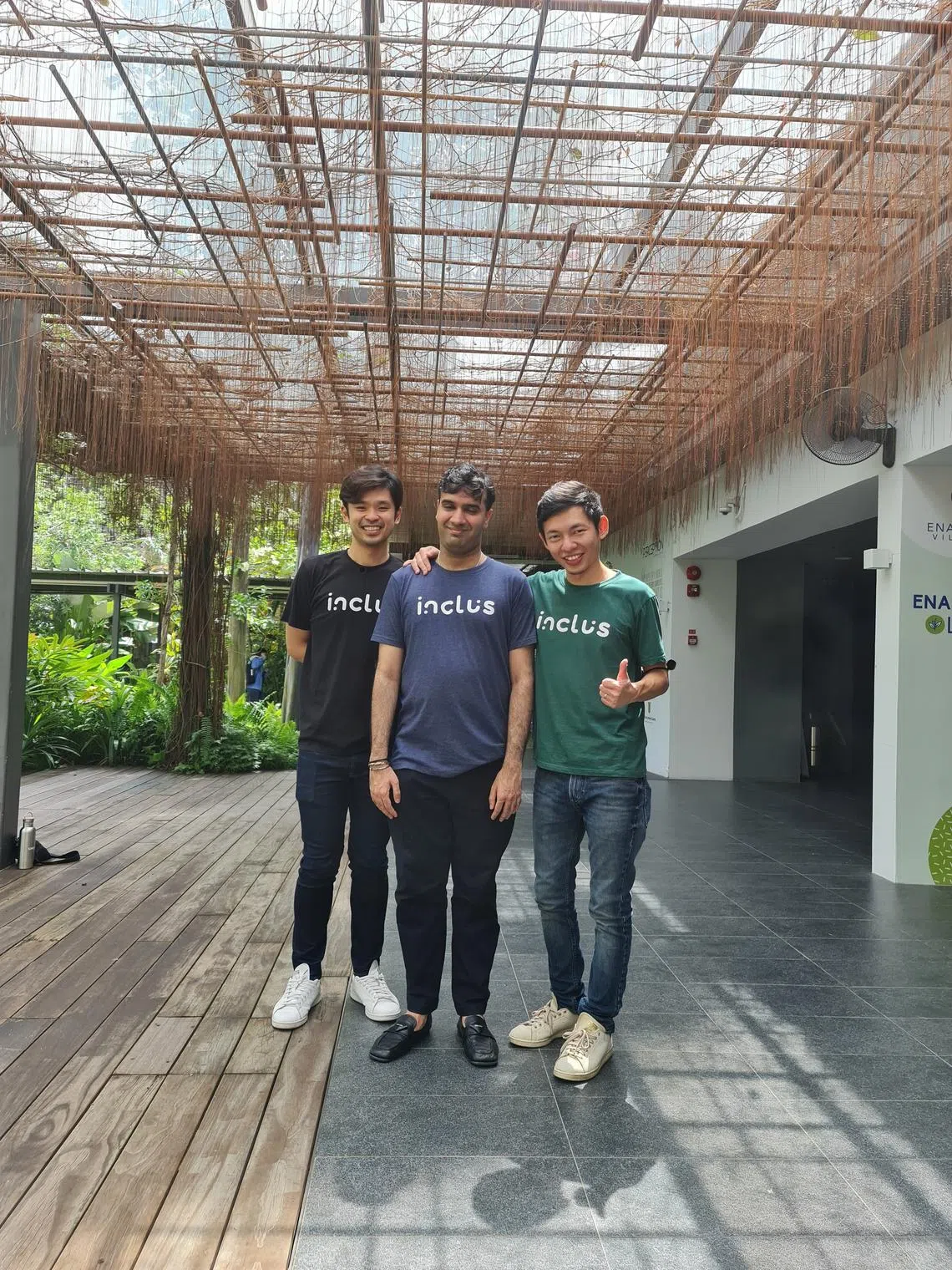Employment agency for persons with disabilities – profitable from Year 2 while doing good
Inclus is also looking out for its job-seeking candidates by preparing them to work with new technologies, and setting up internships for young adults

[SINGAPORE] Inclus, a recruitment agency specifically for persons with disabilities (PWDs), has been pretty busy in its seven years of operations, scaling and moving into new areas in which it can be of service.
Its founders, Shaun Tan, Anders Tan (who are unrelated) and Arudra Vangal, knew from the start, in 2018, that their end-to-end integrated disability employment services outfit would be run on a social enterprise model instead of a purely non-profit one – in other words, they wanted to generate revenue while doing good.
Inclus maintains a single bottom line rather than a double or triple bottom line, because its business model and social mission are intertwined. As Shaun Tan put it, the company has never wanted to be in a position of having to choose between the two.
The pair, former schoolmates at the Singapore Management University, and Vangal, who joined them later, might have hit on something right, for the business was profitable from Year 2, drawing its revenue through fees from companies looking to hire PWDs.
Inclus has placed more than 200 PWDs in roles in sectors, including finance and food and beverage (F&B), since its inception.
It is an issue for PWDs to find – and keep – jobs. The Ministry of Social and Family Development’s 2024 disability trend report indicated that in 2022/2023, the average employment rate among PWDs aged 15 to 64 was about a third (32.7 per cent), up from 28.2 per cent in 2018/2019.
Navigate Asia in
a new global order
Get the insights delivered to your inbox.
Tan said: “Their high level of unemployment is both a problem and an opportunity to be addressed at the same time.”
The rise of artificial intelligence also adds some heat to the problem. Take Michael Ang, a 30-year-old with Down syndrome, but is high-functioning. He works in a restaurant in King Albert Park, and worries that AI would outdo him in productivity and quality of service.
“AI can work more hours and (won’t) complain about being tired,” he said.
A global survey of 11,000 executives, polled for the Future of Jobs 2025 report, found that 41 per cent of employers plan to downsize their workforce because of AI’s potential to replicate job roles.
With such findings in mind, Inclus is going beyond matching PWDs to employers willing to take them in – to taking steps to future-proof its job-seeker candidates. It is also helping businesses to tap the potential and benefits of inclusive employment.
While Inclus has not leaned towards any industry in particular, it has targeted jobs in administration, logistics and engineering, because PWD placements in these sectors tend to be employer- and industry-driven, said Tan.
Even when Covid hit, these industries continued hiring, he said.
Technology for good
Because some companies view employing PWDs as a box-ticking exercise, a tokenism, Tan said that Inclus “asks a lot of questions” to ensure that companies are in it for the right reasons.
The company is also mindful of its PWD candidates would have to fit in at their workplace. Potential employers, on their part, may expect a PWD’s productivity to be on a par with that of other colleagues on the same salary.
Recognising that PWD employees “will take a bit longer to get up to productivity”, Tan said Inclus provides training and job support through partnerships with organisations such as SG Enable, the focal agency for disability and inclusion.
On the possibility that AI could take over the PWDs’ roles in the workplace, Lim Lee Lee, general manager of social enterprise Collective Perspectives, is more sanguine, pointing out that “AI cannot do all the functions for, or of, a PWD”.
She said technology could instead be leveraged to improve lives. This technology could take the form of, for example, AI-powered speech-recognition systems for people with mobility or talking difficulties. “So instead of viewing AI-powered tools as a threat, we need to embrace and learn to work with them. AI-powered tools are compliments and cannot replace the work entirely.”
Lee May Gee, chief executive officer of SG Enable, said: “As technology becomes more pervasive, organisations are increasingly recognising that not all processes can, or should, be fully automated. Human oversight remains essential to ensure accuracy, validity, and responsible decision-making.”
To prepare the younger generation for an AI future, Inclus is also supporting students with special-education needs through internship placements. In this new area, the company works with institutes of higher learning and specialised secondary schools to arrange for the internships for PWDs aged 17 to their 20s.
He added that while Inclus began with adult employment as its focus, the team knew that it had to “engage them earlier in their lives, when they are (still in school or even) as early as when they get diagnosed”.
“This is so that we work with them as early as possible, with employment and independent living as the end goal.”
The company is looking to expand its presence in Asia, and is piloting an after-school care centre in Penang, Malaysia.
Tan said: “The numbers (of PWDs) will not be going away or dropping, and employing (this group) is one of the ways (businesses) can stay relevant in the longer term.”
Inclus was one of the 24 companies awarded the DBS Foundation Grant in 2023, and it is using the grant to build a mobile app to scale its outreach.

Decoding Asia newsletter: your guide to navigating Asia in a new global order. Sign up here to get Decoding Asia newsletter. Delivered to your inbox. Free.
Copyright SPH Media. All rights reserved.

